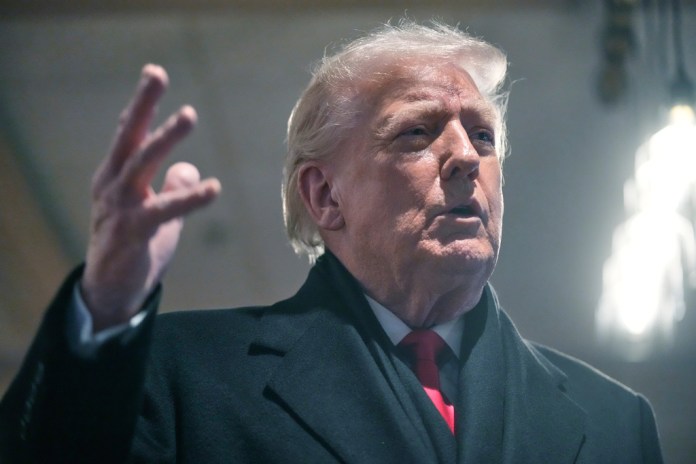Senate Republicans Should End The Filibuster Before It’s Too Late
The article discusses former President Trump’s repeated calls for Senate Republicans to end the filibuster during the historic government shutdown, emphasizing that abolishing this rule would allow the Senate to function more effectively. The filibuster requires 60 votes to end debate on legislation, enabling a minority of 41 senators to block bills, which often results in gridlock and legislative paralysis. Though the filibuster is intended to encourage bipartisan cooperation,it has increasingly been used as a tool of obstruction,preventing major laws from passing and weakening public trust in Congress.The article argues that the filibuster is not mandated by the U.S. Constitution and contradicts the founders’ intent by giving disproportionate power to a Senate minority. While conservatives claim the filibuster controls government growth, the article suggests it has failed to limit government expansion and bureaucracy. Abolishing the filibuster would streamline decision-making without eliminating debate or compromise. It warns conservatives that if they do not act to end the filibuster while holding power, progressive Democrats-who have long advocated its removal to advance their agenda-will do so when they gain control. Ending the filibuster is thus framed as a critical and inevitable step to restore legislative functionality and reflect voters’ will.
In the midst of the recent, historically long government shutdown, President Trump repeatedly called for Senate Republicans to end the filibuster, a longstanding legislative rule requiring 60 votes to cease debate on a bill.
On Nov. 7 alone, Trump posted three times to Truth Social, urging Republicans to abolish the filibuster requirement so the Senate could end what was at the time the nation’s longest-running government shutdown.
“If Republicans kill the Filibuster, they sail to Victory for many years to come,” Trump wrote. “If they don’t, DISASTER waiting to happen!”
On Sunday evening, eight Senate Democrats broke with their party, agreeing to end the filibuster so Republicans could finally stop the government shutdown. But Trump’s warning about the filibuster remains just as important today as it was during the shutdown.
To some readers, the demand to end the filibuster might seem like inside-the-Beltway procedural wrangling, but if it were eliminated, it would completely transform how legislative business is done in Washington. It’s one of the most important issues debated today.
The U.S. Constitution requires only a simple majority to pass a bill in the Senate, but the legislative body’s self-imposed filibuster rule creates an additional, unnecessary barrier by allowing 41 senators to block most legislation from progressing to a full vote.
Because it’s extremely uncommon for one party to hold 60 votes in the Senate, the filibuster forces senators to work across the aisle to get legislation over the finish line. That might sound nice, but in our partisan political climate, it has meant very few bills ever get passed. Currently, the filibuster is the single biggest reason Congress can’t seem to get anything done.
The filibuster is an egregious invention of Washington politicians. It’s designed to empower the minority party in the Senate, often against the wishes of voters, and it undermines the Founding Fathers’ thoughtful governmental design.
The Constitution makes clear that, with only a few exceptions, such as treaties and impeachment, the Senate should operate by simple majority vote. The filibuster is not part of that constitutional framework; it’s merely a procedural rule created by the Senate itself. Allowing 41 senators — in many cases, representing a fraction of the U.S. population — to block legislation supported by the majority effectively grants veto power to the minority that the constitutional framers never envisioned.
Moreover, the filibuster has increasingly been weaponized as a tool of obstruction rather than deliberation. While it was once used sparingly to extend debate on deeply divisive issues, it has evolved into a routine political tactic to paralyze the legislative process.
Nearly every major bill now faces the threat of a filibuster, not because senators seek further discussion, but because the minority party wants to prevent any legislative success by the majority. This has produced gridlock, weakened public trust in Congress, and pushed presidents of both parties to rely on executive orders rather than enacting legislation. Without the filibuster, Congress could more easily satisfy the will of the voters and fulfill its responsibilities, taking influence and power away from the executive branch.
Supporters of the filibuster, especially on the conservative side of the ideological spectrum, argue that it keeps government from growing too quickly by making legislation extremely difficult to pass into law. That might be true, but it’s just as fair to argue that the filibuster prevents Congress from reducing the size of government, limiting the power of out-of-control agencies, reforming gargantuan entitlement programs, and returning authority to the states, where it belongs.
We need not speculate on which ideological camp has benefited the most from the filibuster. The past 100 years have shown that under the current model, government’s size and spending have continued to grow, bureaucrats have become increasingly more emboldened to act against the will of the people, and efforts to limit the size of federal agencies have largely failed. If the filibuster is meant to guard against an ever-expanding federal government, it has failed spectacularly.
Abolishing the filibuster would not erase debate or compromise; it would simply ensure that once debate has occurred, decisions are made. The Senate could still conduct hearings, negotiate amendments, and engage in rigorous discussion, but it would no longer allow a minority to indefinitely hold the legislature hostage.
Perhaps most importantly, conservatives who believe that the filibuster will save the country from an already out-of-control federal government becoming even more dangerous should keep in mind that far-left politicians have been calling for an end to the filibuster for years. It’s only a matter of time before they have the votes in the Senate to achieve that goal, and when they do, it will be their agenda that benefits.
In recent years, Democrats in Congress have called for Washington, D.C., to become a state, a move that would likely result in two additional radical leftist or socialist members added to the Senate. Democrats in Congress have also proposed packing the Supreme Court, adding a “public option” for health insurance, forgiving hundreds of billions in student loan debt, destroying the oil and gas industries, and implementing numerous other radical policies.
These ideas will never become law without ending the filibuster. Far-left members of Congress know this, yet they continue to promise that these reforms will be made soon. We should take them at their word and assume that if they were given the opportunity, they would end the filibuster to get the job done. So what are conservatives waiting for?
The filibuster will end, sooner or later. It would be better for conservatives to act now, while they maintain significant power in the House, Senate, and White House, than to wait for their opponents to make the change when they control the government.
Justin Haskins is a New York Times bestselling author and a vice president at The Heartland Institute.
" Conservative News Daily does not always share or support the views and opinions expressed here; they are just those of the writer."


